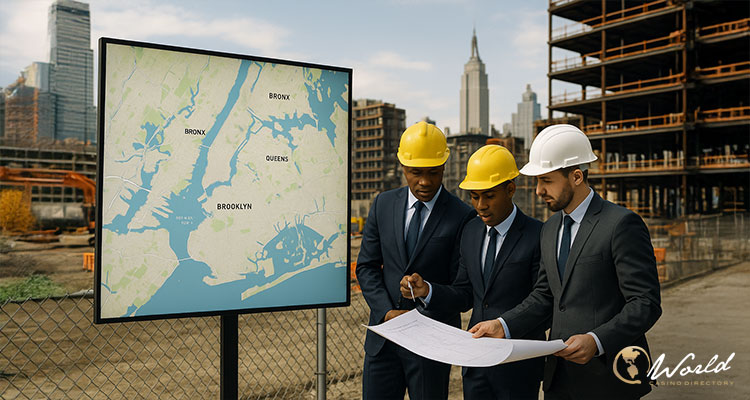New York’s commercial casino licensing process is entering its decisive stretch, with the state’s Gaming Facility Location Board set to tour the three remaining proposed sites on November 17, 2025. The visits represent a critical checkpoint in a long-running evaluation period that will determine which projects secure up to three available downstate casino licenses before the end of the year. Each location review will give officials a firsthand look at transportation logistics, infrastructure design, and development plans, although no public commentary or announcements will take place during the on-site sessions.
Board Prepares for November 17 Tours Across NYC Boroughs
As stated on the Board’s website, the itinerary begins at 10 a.m. at Bally’s Bronx on Hutchinson River Parkway, followed by a 12 p.m. visit to Metropolitan Park in Flushing and a 2:15 p.m. stop at Resorts World New York City in Ozone Park. All visits are open to credentialed press strictly for b-roll footage, and media outlets must register in advance. The Board emphasized that these sessions will not include public engagement, and recordings of the site visits will later be posted on its website.
Alongside the official schedule, another major storyline continues to shape the process: the withdrawal of MGM Yonkers from the competition. Although its Empire City Casino project had initially received Community Advisory Committee approval, MGM Resorts and its VICI real estate partner exited the race citing economic shifts, the cluster of competing bids in a tight geographic area, and updated guidance indicating the license length would be 15 years rather than the 30 years it had anticipated.
In the days leading up to the Board’s assessments, public opinion remained split—particularly in Queens, where two of the race’s remaining contenders are based. Residents voiced a range of views about the Metropolitan Park proposal, backed by Mets owner Steve Cohen and Hard Rock. Some residents focused on perceived benefits, while others highlighted concerns.
Saijai Kaushal said, “I think it could be good. It could bring business to other places around. But it could also draw a certain type of crowd.” Another neighbor, Paula Merchan, questioned whether the development would worsen congestion on the subway, noting she did not know if it was “a good or bad idea” to place a casino in the area. Andrew Kwon added he believes it could be a “cool thing,” explaining, “I feel like a lot of casinos attract a lot of tourism and business.”
However, the project faces challenges beyond community debates. A judge recently ordered the city to halt any agreement that would authorize construction in Citi Field’s parking lot. The ruling follows a lawsuit filed by the United States Tennis Association, which argues that the proposal would violate its lease terms. The Metropolitan Park team responded to the court action by stating, “We disagree with the opinion and are reviewing our options.”
Protests in Queens Intensify Ahead of Final Decision Window
Tension around the Metropolitan Park plan also rose as dozens of protesters gathered outside the Queens Library in Flushing to oppose the casino proposal. Demonstrators expressed fears about displacement, traffic congestion, and gambling-related harms, with one attendee stating the project is “absolutely not a good idea. Not a good bet for this city.” Another critic described the plan as “a racist predatory project coming to the middle of working-class communities who are struggling.”
Despite the pushback, a spokesperson for the project highlighted broad institutional backing, saying the approvals from multiple community and government bodies reflect “deep and broad community support,” and emphasized commitments to union jobs, parkland, and more than $1 billion in community benefits.
As the Board continues its review, each remaining bid—Bally’s Bronx, Hard Rock’s Metropolitan Park, and Resorts World’s expansion plan—will be measured on economic impact, workforce strength, siting considerations, and diversity frameworks. Applicants must commit to at least a $500 million license fee, a $500 million minimum capital investment, and New York’s established gaming tax rates.
The Board is scheduled to issue its recommendations by December 1, with the Gaming Commission required to finalize licenses by December 31.



